Once Saved Always Saved
Once saved always saved
In John Bunyan’s sequel to his timeless classic, Pilgrim’s Progress, he presents a seemingly impossible paradox: it is both easier to be lost and easier to be saved! It is easier to be lost because it requires no effort on anyone’s part in order to be lost. Everyone naturally inclines to do what is wrong because everyone is born with a sinful nature. Therefore, it is a very easy and natural thing to just “go with the flow” and be lost. Once saved always saved
At the same time, it is easier to be saved
Because the way of the transgressor is hard. He has neither moral compass nor voice from heaven saying “this is the way, walk ye in it.” . . . ‘Tis easy to be saved because . . . Jesus paid the price of salvation for us. He has taken our suffering and given us His peace. He has exchanged our weakness for His strength, . . . our sin for His righteousness. As Isaiah hath said, “With His stripes we are healed.”
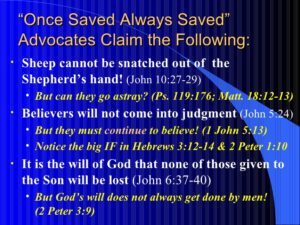 God respects everyone’s right to freedom of choice and He will not force anyone to seek salvation. As we are all are born with an inherent tendency to sin, we must choose to be saved, or we will be lost.
God respects everyone’s right to freedom of choice and He will not force anyone to seek salvation. As we are all are born with an inherent tendency to sin, we must choose to be saved, or we will be lost.
The paradox lies in that many will be lost even though desiring to be saved, and these people will not submit to the purifying and refining process that is required in the born again experience; which is of the Spirit.
They desire the gift of eternal life but will not surrender to the wishes of the Father, and make no attempt to establish a personal relationship with the Son. There is no daily surrender to the ministering works of the Holy Spirit which is required to gain eternal life, and if this is resisted the transformation will stall, and sanctification may fail.
If we desire salvation we must put on the cross and follow Jesus,
“24 If any man will come after me, let him deny himself, and take up his cross, and follow me.
25 For whosoever will save his life shall lose it: and whosoever will lose his life for my sake shall find it.” Matthew 16:24, 25.
we must walk in His footsteps and glorify Him in our actions and deeds.
:Not of works, lest any man should boast.” Ephesian 2:9
This is the fruit of salvation, and it comes from a continual surrender of self, as opposed to a step-by-step process of attainment, by working your way up to Heaven.
“Each day is a continual centering and focus on your maker, and His Word” This is where many fail to comprehend the requirements of salvation, and fail to see the limitations that grace has with respect to the need for our voluntary submission to the will of the Father. Our Creator will not force our hand, so His grace is limited, but only by our willingness to submit to His requirements, the requirements that the Law demands.
Please take heed of the following statements and pay particular attention to the qualifying key words. They may at first appear to contradict, but they do not.
Saved — Assurance “When man is created anew in Christ Jesus, he becomes a partaker of the divine nature. God has, through His own power, united in man the human and the divine. He clothes humanity with the robe of Christ’s righteousness. Man is enabled to discern the Saviour, and by beholding he is changed into the likeness of His character. He recognizes the words of Christ, ‘All power is given unto Me in heaven and in earth.’ He who discerns Christ is a partaker of His Spirit and His righteousness. He has the inward assurance that Christ is abiding in the soul-temple.” E.G. White Manuscript Releases, vol. 21, p. 20.
Compare the above with:
“We are never to rest in a satisfied condition, and cease to make advancement, saying, ‘I am saved.’ When this idea is entertained, the motives for watchfulness, for prayer, for earnest endeavor to press onward to higher attainments, cease to exist. No sanctified tongue will be found uttering these words till Christ shall come…As long as man is full of weakness–for of himself he cannot save his soul–he should never dare to say ‘I am saved.'” E.G. White, 1 SM, p. 314.
Before proceeding further I feel there is a need to qualify the above statement by the following statement from the Ellen White Estate. Once saved always saved
The question asked: Did Ellen White say we can’t know whether we’re saved?
Ellen White did write, “Those who accept the Saviour, however sincere their conversion, should never be taught to say or to feel that they are saved” (Christ’s Object Lessons, 155). However, a closer look at her cautions regarding this subject reveals that, in context, she wasn’t speaking against the certainty of a believer’s present standing with God. Instead, she was warning against the presumptuous “once saved, always saved” teaching of eternal security—against claiming “I am saved” while continuing to transgress the law of God. Here is her full statement:
Peter’s fall was not instantaneous, but gradual. Self-confidence led him to the belief that he was saved, and step after step was taken in the downward path, until he could deny his Master. Never can we safely put confidence in self or feel, this side of heaven, that we are secure against temptation. Those who accept the Saviour, however sincere their conversion, should never be taught to say or to feel that they are saved. This is misleading. Everyone should be taught to cherish hope and faith; but even when we give ourselves to Christ and know that He accepts us, we are not beyond the reach of temptation. God’s Word declares, “Many shall be purified, and made white, and tried” (Dan. 12:10). Only he who endures the trial will receive the crown of life (James 1:12) (Christ’s Object Lessons, 155, emphasis added).
That Ellen White understood the proper basis for true Christian assurance is evidenced by the following remark she made before the church’s General Conference session:
“Each one of you may know for yourself that you have a living Saviour, that He is your helper and your God. You need not stand where you say, ‘I do not know whether I am saved.’ Do you believe in Christ as your personal Saviour? If you do, then rejoice” (The General Conference Bulletin, April 10, 1901).
To a woman who was struggling with doubts, Ellen White wrote,
The message from God to me for you is “Him that cometh unto me, I will in no wise cast out” (John 6:37). If you have nothing else to plead before God but this one promise from your Lord and Saviour, you have the assurance that you will never, never be turned away. It may seem to you that you are hanging upon a single promise, but appropriate that one promise, and it will open to you the whole treasure house of the riches of the grace of Christ. Cling to that promise and you are safe. “Him that cometh unto me, I will in no wise cast out.” Present this assurance to Jesus, and you are as safe as though inside the city of God (Manuscript Releases, 10:175).
So there you have the more complete picture. Mrs. White did advise against a “once saved, always saved” viewpoint. But she knew how to present a biblical assurance to those plagued with doubt. “Ellen White Estate”
So the doctrine of “Once Saved Always Saved” has no Scriptural support
“When the righteous turneth from his righteousness, and committeth iniquity, he shall even die thereby.” Ezekiel 33:18.
“It is impossible for finite minds to comprehend the work of redemption. Its mystery exceeds human knowledge; yet he who passes from death to life realizes that it is a divine reality.” Desire of Ages, 173.
Small Number Saved — “I was shown the startling fact that but a small portion of those who now profess the truth will be sanctified by it and be saved. Many will get above the simplicity of the work. They will conform to the world, cherish idols, and become spiritually dead. The humble, self-sacrificing followers of Jesus will pass on to perfection, leaving behind the indifferent and lovers of the world.” Testimonies, Vol. 1, 608.
Obviously the 144,000 pass on to perfection because they have no guile. But there is a great innumerable multitude above and beyond the 144,000.
This is supported by Scripture in Matthew 7: 13, 14.
“13 Enter ye in at the strait gate: for wide is the gate, and broad is the way, that leadeth to destruction, and many there be which go in thereat:
14 Because strait is the gate, and narrow is the way, which leadeth unto life, and few there be that find it.” Matthew 7: 13, 14.
“Never can we safely put confidence in self or feel, this side of heaven, that we are secure against temptation. Those who accept the Saviour, however sincere their conversion, should never be taught to say or to feel that they are saved. This is misleading. Every one should be taught to cherish hope and faith; but even when we give ourselves to Christ and know that He accepts us, we are not beyond the reach of temptation. God’s word declares, ‘Many shall be purified, and made white, and tried.’ Dan. 12:10. Only he who endures the trial will receive the crown of life. (James 1:12.).
Those who accept Christ, and in their first confidence say, I am saved, are in danger of trusting to themselves. They lose sight of their own weakness and their constant need of divine strength. They are unprepared for Satan’s devices, and under temptation many, like Peter, fall into the very depths of sin. We are admonished,
‘Let him that thinketh he standeth, take heed lest he fall.’ 1 Cor. 10:12. Our only safety is in constant distrust of self, and dependence on Christ.” Christ’s Object Lessons, p. 155.
“When the conflict of life is ended, when the armour is laid off at the feet of Jesus, when the saints of God are glorified, then and then only will it be safe to claim that we are saved, and sinless.” Selected Messages, Book 3, p. 356.
“I am a sinner, and He died upon Calvary’s cross to save me. I need not remain a moment longer unsaved. He died and rose again for my justification, and He will save me now. I accept the forgiveness He has promised.” E.G. White, Selected Messages, Book 1, 392.
“I have listened to testimonies like this: ‘I have not the light that I desire; I have not the assurance of the favor of God.’ Such testimonies express only unbelief and darkness. Are you expecting that your merit will recommend you to the favor of God, and that you must be free from sin before you trust his power to save? If this is the struggle going on in your mind, I fear you will gain no strength, and will finally become discouraged. As the brazen serpent was lifted up in the wilderness, so was Christ lifted up to draw all men unto him. All who looked upon that serpent, the means that God had provided, were healed; so in our sinfulness, in our great need, we must ‘look and live.’ While we realize our helpless condition without Christ, we must not be discouraged; we must rely upon the merits of a crucified and risen Saviour. Poor sin-sick, discouraged soul, look and live. Jesus has pledged his word; he will save all who come unto him. Then let us come confessing our sins, bringing forth fruits meet for repentance.” E.G. White, Second Advent Review and Sabbath Herald, 04-22-84, pr. 5.
From whence does the teaching “Once saved always Saved” originate?
To understand the significance of this false teaching and also that of the doctrine of Salvation by Faith and Works, which we have touched upon in another article on the page “False doctrines/faith and works” we need to take a look at the doctrines of the Nicolaitans which Jesus declared His hatred for in Revelation 2: 6, 15.
“But this thou hast, that thou hatest the deeds of the Nicolaitans, which I also hate”. Revelation 2:6.
“So hast thou also them that hold the doctrine of the Nicolaitans, which thing I hate.” Revelation 2:15.
This message that Jesus give us here is a message that I believe is greatly overlooked in its import, these messages are messages of warning that are given to All the ekklesia of the New Testament dispensation.
What do we know about the Nicolaitans? Once saved always saved
What were their teachings and doctrines that Jesus so abhorred, and in what way are they connected with the doctrines of “Salvation by Grace Alone” (Without Bearing Fruit) of “Salvation by Grace and Works” and “Once Saved Always Saved”?
The Doctrine of the Nicolaitans
Published by Omega Countdown Ministries
In Revelation 2:6, and 2:15, it is stated that God hates the Doctrine of the Nicolaitans.
What is that doctrine? Once saved always saved
We will quote a number of sources on the Doctrine of the Nicolaitans.
First, the SDA Bible Dictionary:
“The doctrine of the Nicolaitans appears to have been a form of antinomianism (see SDACom 7:957).Nicolaitans of the 2d cent. seem to have continued and extended the views of the 1st-cent. adherents, holding to the freedom of the flesh, and teaching that the deeds of the flesh had no effect upon the health of the soul and consequently no relation to salvation.” SDA Bible Commentary, vol. 8, p. 771.
Definition of antinomian: a believer in the doctrine that faith alone, not obedience to the moral law, is necessary for salvation.” Websters NewWorld Dictionary.
This is precisely what New Movement Seventh-day Adventists (Selected Messages, vol. 1, 204-205), teach. Now for further delineation of the Doctrine of the Nicolaitans: The part of the Doctrine of the Nicolaitans that New Movement Seventh-day Adventists are guilty of embracing is:
According to the source entitled “The Nicolaitans by Al Maxey:
“None of the earlier church writers (or later ones, for that matter) have anything good to say about the beliefs or practices of this group. The Constitutions of the Holy Apostles states that ‘those who are falsely called Nicolaitans, are impudent in uncleanness….’ Tertullian (with regard to marriage) says, ‘The Nicolaitans, in their maintenance of lust and luxury, destroy the happiness of sanctity.’ Irenaeus writes, ‘they lead lives of unrestrained indulgence,’ and teach ‘it is a matter of indifference to practice adultery, and to eat things sacrificed to idols.’ Ignatius brands them as ‘lovers of pleasure, and given to slanderous speeches.’ He also says that they ‘affirm that unlawful unions are a
good thing, and place the highest happiness in pleasure. A question which comes immediately to mind at this point is: How could a group of individuals in the early church hold to such beliefs and practices and still profess to be followers of Jesus Christ?! Would they not see the inconsistency? The answer apparently is that, like Balaam, they were self-deceived and self-deluded. This caused them to gloss over their obvious wickedness, and to dress it up so as to make it more acceptable to both themselves and those around them. Contributing to this state of self-deception is the fact that they may also have been misinterpreting a passage from one of the epistles of Paul–‘All things are lawful for me’ (1 Cor. 6:12)…..
The Nicolaitans, having possibly misunderstood this and other related passages….or perhaps having intentionally perverted them…..declared themselves free in Christ to do as they pleased, regardless of who it hurt or who was offended. This even included committing acts of immorality! After all, hadn’t Paul said, ‘All things are lawful for me’? This may all seem rather absurd to us, even hard to believe, yet one won’t have a great deal of difficulty finding those in the Lord’s church today who, at least in principle if not in fact, hold to these same Nicolaitan beliefs! These are those who see nothing wrong with a certain amount of compromise with the world about them, with becoming more and more worldly in nature and practice, while still claiming to be faithful disciples of Christ! Such compromise is nothing short of that ancient Nicolaitan heresy raising its ugly head in a modern setting….. In the same way, our salvation in Christ, and our faith, is not truly demonstrated to others or made stronger by trying to prove that we can wallow in the world [SIN] and still come away appearing to be clean! Rather, it is displayed by rejecting the activities of the world,
and by living n such a way that we might be presented to the Bridegroom as a ‘pure virgin'” (II Cor. 11:2). End Reference by Al Maxey.
Omega Ministry Commentary: Go to my WebSite (Those of you who have access to the Internet) and read the two articles on Celebrationis, to find that in some of these churches practicing such charismata, they are engaging in wife-swapping. Just as there are all degrees of commandment-breaking, so there are all degrees of practicing the Doctrine of the Nicolaitans, without practicing every element of it. However, I will be quick to add, that those, such as New Movement Seventh-day Adventists, who teach that it is impossible to keep the commandments of God by His enabling grace and inner presence, are guilty of violating all the base Doctrines of the Nicolaitans, because they teach in principle that it is impossible not to
sin! I am not suggesting that New Movement Adventists engage all that is mentioned as part of the Doctrine of the Nicolaitans, but they might as well, because they teach others that commandment keeping
that prohibits such acts is impossible. Thus, in principle, they teach others to do such abominations with impunity, because they say one can be saved while imbibing all manner of sinfulness, by only believing. This is, in essence, the doctrine of the Nicolaitans. There are many different sects and factions of “professing Christianity” that indulge one or more of these violations. Christ’s teachings on the principles of the Law, would indicate that it is just as bad to teach that it is impossible not to commit adultery as to
actually commit it oneself! The same principle of the Law, would teach that it is just as bad to eat things offered to idols as to teach that it is impossible not to obey God’s command not to! It is most obvious to
any discerning mind that does not need every fine point illustrated, that the doctrine of the Nicolaitans taught freedom from law or commandment-keeping. Ant that is precisely what Page and party teach. That it is impossible to do so.
The Doctrine of the Nicolaitans and Ecumenism
“And what agreement hath the temple of god with idols? for ye are the temple of the living God; as God hath said, I will dwell in them, and walk in them; and I will be their God, and they shall be my people. Wherefore come out from among them, and be ye separate, saith the Lord, and touch not the unclean ting; and I will receive you, And will be a father unto you, and ye shall be my sons and daughters, saith the Lord Almighty.” II Cor. 6:16, 17.
Doctrine of the Nicolaitans According to Ellen White
“Doctrine of the Nicolaitans.– The doctrine is now largely taught that the gospel of Christ has made the law of God of no effect; that by ‘believing’ we are released from the necessity of being doers of the Word. But this is the doctrine of the Nicolaitans, which Christ so unsparingly condemned.” E.G. White, SDA Bible Commentary, vol. 7, 957, and Signs of the Times, Jan 2. 1912.
New Movement Adventists teach exactly as Ellen White describes above. They teach the Doctrine of the Nicolaitans. If we cannot overcome; if we cannot keep the commandments of God, and can be saved anyway, let’s have a party! Let’s meet in Las Vegas, and let anything go! Why not?! If you need a little money, go rob a bank. If you do not like someone, kill them. You will still be saved, because Christ’s robe of righteousness will cover all such sins, just remember to always repent after your always sin!
THE NICOLAITANS
by Al Maxey
In Rev. 2:6 Jesus praises the church in the city of Ephesus for “hating the deeds of the Nicolaitans,” which our Lord then states He also hates. Later, in verse 15, He declares His displeasure with the saints in Pergamum. Why? Because “you have some who hold the teaching of the Nicolaitans.” In Ephesus this group was quickly turned away, which gained the praise of Jesus Christ. In Pergamum they were welcomed, and even embraced, thus incurring our Lord’s condemnation.
Who were the Nicolaitans? Where did they come from? What did they believe? Once saved always saved
These are just a few of the many questions which have been repeatedly asked for centuries, and the answers are not quickly or
easily perceived, in part because this group is mentioned by name only twice in the entire Bible (Rev. 2:6, 15).
Some have stated, in a rather general way, that they were simply a small, insignificant sect within the early church who held to some rather strange beliefs. They surfaced here and there and eventually died out altogether without causing much of a stir. Others identify them as being an early gnostic group — Gnosticism being one of the major heresies which plagued the Lord’s church during the first few centuries. Still others suggest they were really just worshippers of Baal which were going by a different name to protect themselves from persecution. A few scholars even maintain that no such group ever actually existed. The “Nicolaitans” were merely a symbol employed by the Lord, and the term was not to be taken literally.
As already noted, the Bible itself says little about the Nicolaitans. To discover more about them one must appeal to the non-biblical writers of that period of time. These early church authors are often referred to as the Apostolic Fathers. Although these men were not inspired of God in what they wrote (as is often evident in their writings!), yet they are a valuable source of information and insight concerning the history and practices of the early church. Thus, biblical scholars rely rather heavily upon them for much of our knowledge about this period of church history.
THEIR ORIGIN Once saved always saved
To begin our study, we must try to determine the origin of this group. Where did they come from? Who was their founder? What caused such a group to be formed? As one might imagine, there are numerous theories which speculate as to the origin of the Nicolaitans. The prevailing theory, however, is that it was founded by a man named Nicolaus, the same Nicolaus listed in Acts 6:5 as one of the seven Spirit-filled men chosen to oversee a special ministry in the Jerusalem church.
Acts 6:5 — “And they chose Stephen, a man full of faith and of the Holy Spirit, and Philip, and Prochorus, and Nicanor, and Timon, and Parmanas, and Nicolaus, a proselyte of Antioch.”
Many early church writers feel it was this particular proselyte of Antioch who eventually departed from sound doctrine, and influenced others with his strange and deadly doctrine. About a hundred years after the writing of Revelation, an early church writer by the name of Hippolytus wrote:
“Nicolaus, as one of the seven (that were chosen) for the diaconate, was appointed by the Apostles. (But Nicolaus) departed from correct doctrine, and was in the habit of inculcating indifferency of both life and food. And when the disciples (of Nicolaus) continued to offer insult to the Holy Spirit, John reproved them in the Apocalypse as fornicators and eaters of things offered unto idols.”
“About two hundred years later, John Cassian wrote: “We need never …. wonder that some bad and detestable men have secretly found their way into the number of the saints. If we bear in mind that Satan was chosen among the angels, and Judas among the apostles, and Nicolaus the author of a detestable heresy among the deacons, it will be no wonder that the basest of men are found among the ranks of the saints.”
Thus, we soon discover that many of the early church writers held to the view that this previously highly favored man, who had been appointed by the apostles to a position of responsibility and trust in the church, had not lived up to his calling ….. and, indeed, had become an apostate! Though he is condemned by many, the evidence basically comes from a single source — a brief story told by Clement of Alexandria (about a hundred years after the writing of Revelation) and recorded for us by Eusebius:
“This man (Nicolaus), it is said, had a young and lovely wife. And when he was reproached by the apostles, after the ascension of the Saviour, for jealousy, he brought her into their midst and bade anyone marry her who wished. For this action, it is said, was in accordance with that saying (of his), ‘One ought to abuse the flesh;’ and, as a matter of fact, the members of his sect have followed both example and precept absolutely and without question, and commit fornication freely.
But for my part, I understand that Nicolaus had intercourse with no woman except his wife; and that, as regards his children, the daughters grew old in a state of virginity, while his son preserved his chastity. Such being the case, when he brought the wife, whom he jealously loved, publicly into the midst of the apostles, it was to renounce his passion; and it was self-control, in the face of pleasures men eagerly seek, that taught him to say ‘abuse the flesh.’ For, I imagine, in accordance with the Saviour’s command, he did not wish to serve two masters, pleasure and the Lord.”
As one can see from this ancient account, Clement defends Nicolaus and his actions, declaring that it was his passion for Christ, not the flesh, that led him to do what he did. Now, whether Nicolaus ever actually performed such an act or not is impossible to say. But, even if he did, this is no proof that he founded such a group as the Nicolaitans, which apparently practiced acts of immorality.
Indeed, Clement argues that he did not! If indeed the above described act occurred, it is possible that some
who may have witnessed it, or who perhaps later heard the story recounted, may have interpreted it to mean that immorality was acceptable. After all, here was a “Spirit-filled Deacon” in the church offering his wife to the congregation! Thus, it must be OK!
It is also possible that as this early heretical group grew and developed, perhaps adopting other questionable practices as well, that it may have adopted for itself the name of Nicolaus. It was a common practice among early heretics to take the name of an apostle, or one of their associates, in an effort to try and gain respectability for themselves and their doctrines and practices. This is probably the case with the Nicolaitans, as a great many early church writers suggest. Eusebius, for example, says that “these persons made their boast of Nicolaus.” Ignatius of Antioch (martyred in Rome just twenty years after the time of Revelation) twice makes mention of the
Nicolaitans as impostors, saying they are “falsely so called.”
After examining every reference to this heretical group in the writings of the Church Fathers, and weighing the evidence, it is the conclusion of this author that the Nicolaitans were not directly founded by the Nicolaus mentioned in Acts 6:5. Rather, the evidence suggests this group adopted his name in hopes of lending a degree of respectability and acceptance to their doctrines and practices.
THEIR BELIEFS & TEACHINGS
What was it about this group that caused them to be so detestable in the sight of the Lord, and also in the sight of the church at Ephesus? What exactly did they believe and teach and practice that generated such feelings of abhorrence?
Although the early church writers disagreed on who founded the Nicolaitans and how they came by their name, there is little to no disagreement on what they taught and believed.
Apparently, they were very similar to the Balaamites of the OT, in that they committed acts of immorality (fornication) and they ate meat that had been offered to idols.
In Rev. 2:14-15 the Lord makes this connection plain:
“You have there some who hold the teaching of Balaam, who kept teaching Balak to put a stumbling block before the sons of Israel, to eat things sacrificed to idols, and to commit acts of immorality. You also have some who in the same way hold the teaching of the Nicolaitans.”
It is also likely that Jezebel, whom Jesus condemns in the epistle to Thyatira, was a member of the Nicolaitans, for Rev. 2:20 says,
“she teaches and leads my bond-servants astray, so that they commit acts of immorality and eat things sacrificed to idols.”
These are the same offenses earlier condemned as practices of the Nicolaitans.
None of the earlier church writers (or later ones, for that matter) have anything good to say about the beliefs or practices of this group.
The Constitutions of the Holy Apostles states that “those who are falsely called Nicolaitans, are impudent in uncleanness.”
Tertullian (with regard to marriage) says, “The Nicolaitans, in their maintenance of lust and luxury, destroy the happiness of sanctity.”
Irenaeus writes, “they lead lives of unrestrained indulgence,” and teach “it is a matter of indifference to practice adultery, and to eat things sacrificed to idols.”
Ignatius brands them as “lovers of pleasure, and given to slanderous speeches.”
He also says that they “affirm that unlawful unions are a good thing, and place the highest happiness in pleasure.”
A question which comes immediately to mind at this point is: How could a group of individuals in the early church hold to such beliefs and practices and still profess to be followers of Jesus Christ?!
Would they not see the inconsistency? The answer apparently is that, like Balaam, they were self-deceived and self-deluded.
This caused them to gloss over their obvious wickedness, and to dress it up so as to make it more acceptable to both themselves and those around them. Contributing to this state of self-deception is the fact that they may also have been misinterpreting a passage from one of the epistles of Paul —
“ALL things are lawful for me” (I Cor. 6:12).
Paul later writes: I Cor. 8:4, 7-8 —
“Therefore, concerning the eating of things sacrificed to idols, we know that there is no such thing as an idol in the world, and that there is no God but one. However not all men have this knowledge; but some, being accustomed to the idol until now, eat food as if it were sacrificed to an idol; and their conscience, being weak, is defiled. But food will not commend us to God; we are neither the worse if we do not eat, nor the better if we do eat.”
The Nicolaitans, having possibly misunderstood this and other related passages ….. or perhaps having intentionally perverted them ….. declared themselves free in Christ to do as they pleased, regardless of who it hurt or who was offended. This even included committing acts of immorality! After all, hadn’t Paul said, “ALL things are lawful for me”?
This may all seem rather absurd to us, even hard to believe, yet one won’t have a great deal of difficulty finding those in the Lord’s church today who, at least in principle if not in fact, hold to these same Nicolaitan beliefs!
These are those who see nothing wrong with a certain amount of compromise with the world about them, with becoming more and more worldly in nature and practice, while still claiming to be faithful disciples of Christ!
Such compromise is nothing short of that ancient Nicolaitan heresy raising its ugly head in a modern setting!
A scholar by the name of Fiorenaz makes the following observation:
“Whereas the Nicolaitans considered themselves free to participate in idolatrous feasts because of their salvation in Christ, the author of Revelation emphasizes that salvation and Christian existence has to be proved in the rejection of both idolatry and participation in the Roman civil religion.”
In the same way, our salvation in Christ, and our faith, is not truly demonstrated to others or made stronger by trying to prove that we can wallow in the world and still come away appearing to be clean! Rather, it is displayed by rejecting the activities of the world, and by living in such a way that we might be presented to the Bridegroom as a “pure virgin” (II Cor. 11:2).
CIRCUMSTANCES LEADING TO NICOLAITANISM Once saved always saved
Another question which arises at this point is: Were there possibly certain circumstances in these cities of Asia Minor which may have given rise to these doctrines … or made it profitable and even advisable (from an earthly perspective) to embrace them?
Although this heresy didn’t catch on in Ephesus, it did in Pergamum and Thyatira. What was there in these two cities which may have been conducive to the growth of Nicolaitanism? When one examines a map, it will become clear that Pergamum and Thyatira are only about thirty miles apart. Both are located in the northern part of the land, and are separated geographically from the other five cities mentioned in Revelation.
The real key, however, is that these two cities were extremely trade-guild oriented. These guilds were similar to the labor unions of today. The guilds were very pleasure oriented, idols were worshipped during their meetings, they ate food offered to the idols, and there were also very wild, immoral parties for the members, so that they could “loosen up” and become happier, more productive workers.
Ramsay, in his book The Letters to the Seven Churches of Asia, writes:
“It may be regarded as certain that the importance of the trade-guilds in Thyatira made the Nicolaitan doctrine very popular there. The guilds were very numerous in that city, and are often mentioned in great
variety in the inscriptions. It was, certainly, hardly possible for a tradesman to maintain his business in Thyatira without belonging to the guild of his trade.
The guilds were corporate bodies, taking active measures to protect the common interests, owning property, passing decrees, and exercising considerable powers. In no other city, save Pergamum, are they so conspicuous. It was therefore a serious thing for a Thyatiran to cut himself off from his guild.” Undoubtedly, many members of the early church made their livings at a trade which required that they be members of a certain trade-guild. And to be a member meant attending the meetings, and taking an active part, so as not to be viewed unfavorably by the guild.
To be viewed unfavorably could lead to dismissal from the guild, which meant loss of one’s profession and source of income. A person could literally go from riches to rags depending on how he or she was
viewed by the guild. Thus, Christians were faced with a problem; a problem compounded by the fact that at these meetings not only were there sacrifices made to idols (and all members were required to participate), but there was also drinking and open sexual activity. It was considered the duty of the members to participate. From a worldly point of view, these guilds were just trying to help their members be better employees. It really wasn’t viewed as sinful or immoral. In fact, these acts were viewed as being religious acts. Sacrifices to various gods were made during the meetings, and the services of temple prostitutes were even engaged.
What was the Christian worker to do?! Once saved always saved
Many, obviously, quit their guilds, and in so doing lost their ability to earn an income. They were willing to make this sacrifice, however, in order to remain faithful to their Lord. Some, however, were not willing to go that far. Thus, they needed to find a way to rationalize their continued involvement in the practices of the guild. This they did by proclaiming themselves “free in Christ.” Many perhaps reasoned: If we stay in the guild and continue
our association with these people, we might even be able to influence them to accept Christ. Others began to teach that it was really only the physical body (the flesh) which was actually engaging in the immoral
practices anyway, and so as long as they remained pure in spirit then God would accept them.
This latter view was a definite reflection of the Gnostic teaching of the first century, and perhaps also reflects a
twisting of Paul’s statement in Romans 7:14 about the conflict of the two natures.
With all of this “logic” at their disposal, their consciences were eased, and they viewed themselves as members in good standing both of the church and of the guild — and apparently the church in both of these cities did not strongly enough disagree with this view, for Jesus not only condemns those who were involved in this compromise with the world, but He also condemns the congregations for tolerating it!!
The evidence, both biblical and extra-biblical, seems to clearly point to the fact that the group known as the Nicolaitans arose from a perceived need of some early Christians to conform to their society to a certain extent for their own survival, and in a willingness to pervert certain passages of Scripture in an attempt to try and justify their conformity.
Perhaps this group can best be described, in the words of Fiorenaz, as “a Christian libertine group within the churches of Asia Minor.” They viewed themselves to be at liberty to compromise with the world.
LATER HISTORY
It appears that this group did not long survive … at least, not in as open and recognizable a form as it had been at first.
According to Eusebius, the Nicolaitans “arose for a very brief time … and in less time than it takes to say it, were completely extinguished.” The word “Nicolaitan” itself, however, lasted for many centuries. In time, it came to be freely applied to those who were the object of the user’s contempt.
It came to have much the same connotation as “Judas” has for some — characterizing one as a traitor. In the Middle Ages, for example, the word was used by the Roman Catholic Church to describe those priests who approved of clerical marriage. Hastings, in his dictionary, writes: “In the disputes as to the celibacy of the clergy, again the term was applied to the married priests by the opponents of clerical marriage. It appears to have been first used in this connection by Cardinal Humbert who described the ‘Nicolaitan heresy’ as consisting in the justification of clerical marriage; and in that sense it obtained official recognition in the canons of the Council of Piacenze in March, 1095 AD.”
Even today the term has not died out completely. Occasionally one will still hear the term applied by one opponent to another. Recently, for example, one church leader castigated all “liberals” as being “Nicolaitans.” Nicolaitanism, thus, was equated to Liberalism.
Another religious leader recently condemned the celebrating of Christmas as being the “Nicolaitan heresy.” His logic was that this holiday is associated with “St. Nicolas” — or Santa Claus!
Thus you also have some who in the same way hold the teaching of the Nicolaitans.
Repent therefore; or else I am coming to you quickly, and I will make war against them with the sword of My mouth. He who has an ear, let him hear what the Spirit says to the churches” (Rev. 2:15-17).
CONCLUSIONS
It is this author’s belief that the “Nicolaitan heresy” never truly died. It still exists in the church today just as much as it did in the early church … if not more!
The belief among some in the Body of Christ that they
are free in Christ to engage in sinful practices, that they can successfully serve two masters, that they can acceptably compromise with the world and still be “Christians in good standing,” has never really left us! And such compromisers still attempt to twist God’s Word to try and justify their sinful practices. And, sadly, we, in the church, still too often continue to tolerate them in our midst.
In Christianity there can be “No” compromise with the world about us, regardless of what sacrifices one may be called upon to make! The message to the early church by our Lord applies just as much today as it did in the first century …. for the danger is just as great!
The Following Article comes from ltradio.org who have kindly given permission to re-post it without alteration
The Doctrine of the Nicholatians
Revelation 2:6, “Thou hated the deeds of the Nicolaitans, which I also hate.”
God loves, but He also hates. He hates sin because it is so deadly. “The wages of sin is death.” Every true Christian must hate sin and deception.
Who were the Nicolaitans? What was their doctrine that Christ twice stated He hated? Revelation 2:6, 15.
Historic view:
The Nicolaitans were a group of professed Christians who believed in a community of wives. When “Thou shall not commit adultery” was quoted, their favorite reply was “We are not under law, but under grace.” They claimed they were free from the law and that the Ten Commandments are not binding on Christians.
“The Nicolaitans were persons who excused certain forms of impurity, and made the grace God a cloak for lasciviousness. This belief is known as Antinomianism, which means that the gospel frees Christians from required obedience to any law, whether scriptural, civil or moral, and that salvation is attained solely through faith and the gift of divine grace. That means there is no need for ‘Sanctification‘.
The Nicolaitans were the Antinomians of the Asiatic Church. They didn’t care about how they were living morally daily and their conduct were little thought of. They believed that the faith they professed was everything. (Therefore not needing to live their lives in accordance to what they believed in)
“The existence of a sect called Nicolaitans in the second century is attested by Irenaeus, Tertullian and Clement of Alexander.” The Commentary for Schools, Edited by C. J. Ellicott, DD.
“Their doctrines and lives were equally corrupt. They allowed the most abominable lewdness, (behaving in obscene manner) and adulteries, as well as sacrificing to idols. John Wesley, Explanatory Notes Upon the New Testament on Revelation 2:6
Nicolaitans taught and practiced “Ritualism without spirituality, knowledge without practice. Justification by faith without holiness.” Dr. Angus, Bible Handbook.
This dangerous heresy was being taught in the church of Ephesus, the church of the first century. Jude 1:4, warns of ungodly men who were “turning the grace of our God into lasciviousness.” Lasciviousness is “immorality” or “profligacy.”
The Nicolaitans used the grace of God as an excuse for the violation of God’s law – the moral law. They denied “the only Lord God and our Lord Jesus Christ.” Jude 1:4. The Nicolaitans were willing to acknowledge Jesus as their Savior but not as their Lord and Master. In Luke 6:46 Jesus asked
“Why call you me Lord, Lord, and do not the things which I say?”
It was this teaching of the Nicolaitans in the first century that was still corrupting the church of Pergamos a few
centuries later, (Revelation 2:15) that led to the changing of God’s “Royal Law,” the Ten Commandments.
The second commandment that forbids the worship of images was dropped from the ten. When the binding nature of that commandment was emphasized, it was lightly brushed aside with “We are not under law, but under grace,” “Christians are free from the law,” “We enjoy Christian liberty.”
Like other followers of the Gnostic traditions, the Nicolaitans sought hidden spiritual knowledge through mystical experiences. They believed that this knowledge alone was perfectly sufficient for salvation. They also taught that man’s spiritual and physical natures are two completely separate things. This philosophy implied that they were free to commit sexual immorality and to overindulge themselves in any and every way.
The doctrine of the Nicolaitans was all too evident.
The precepts of the Ten Commandments were not binding with respect to the Christians, and our Savior had come to destroy the law, and not to fulfill it!” God says He hates this antinomianism and commended His people of the first century for hating it too. Revelation 2:6.
There is no need to be confused over the wonderful truth of Grace. Every one who is saved is saved by Grace. Ephesians 2:8,9.
We are saved by grace through faith. It is the gift of God. It is not of works. Grace is not limited to the New Testament, but it covers all time and spans all history.
The Grace of God in the Old Testament.
Titus 2: 11, The grace of God that brings salvation hath appeared to all men.” Exodus 34:6, To Moses, our Lord was “merciful and gracious.”
Exodus 25:21, Upon the Ark was the Mercy seat and inside the Ark was placed “the testimony” The Ten Commandments.
- Genesis 6:8, Before the Flood, Noah “found grace in the eyes of the Lord.”
- Genesis 19:19, Lot, when saved from Sodom declared he had “found grace.”
- Jonah 4:2, Jonah said, “I knew that Thou art a gracious God.”
- Psalms 77:9, The Psalmist knew of God’s grace. Exodus 33:12 “Grace”
- Exodus 33:13 “Grace,”
- Exodus 33:16 “Grace,”
- Exodus 33:17 “Grace,”
- Exodus 33:19 “Gracious.”
- Exodus 34: 6 “Gracious.”
- Zechariah 4:7 It shouts “Grace! Grace!”
- Yet some foolishly say there is no grace in the Old Testament. In the New Testament people were not saved by works, but solely by Grace.
- Acts 4:12 Salvation is only through one Name Jesus.
- Romans 4:6 David was saved without works.
- Revelation 1:5 In the Glory land, all will praise Jesus for salvation through His blood.
- Revelation 5:13, Revelation 7:14.
- In the New Testament all good men walked in faith and obedience.
- Hebrews 11:4 Abel’s faith and obedience,
- Hebrews 11:5 Enoch’s faith and obedience,
- Hebrews 11:7 Noah’s faith and obedience,
- Hebrews 11:8,9 Abraham’s faith” and “obeyed,”
- Hebrews 11:23-29, “These all obtained a good report through faith.”
- In the New Testament, Faith and Commandments go together.
- Revelation 14:12 Faith of Jesus and the commandments of God.
- Romans 3:31 Faith establishes the law
Grace today proves the Commandments are still binding.
No one needs grace or mercy if they have not broken the law.
“Where there is no law there is no transgression.”
Romans 6:14,15, Sin is forbidden under grace.
1 John 3:4, Sin is the breaking of God’s law. The saved man loves God’s Ten Commandments.
Romans 8:7, It is only the carnal mind that hates God’s commandments.
EXTRA NOTES ON THE NICOLAITANS
“The doctrine is now largely taught that the gospel of Christ has made the law of God of no effect; that by “believing” we are released from the necessity of being doers of the Word. But this is the doctrine of the Nicolaitans, which Christ so unsparingly condemned.” Ellen G. White in “Signs of the Times,” February 25, 1897.
It is our work to know our special failings and sins, which cause darkness and spiritual feebleness, and quenched our first love . . . . . Is it the sin of the Nicolaitans, turning the grace of God into lasciviousness?” Ellen G. White, in the “Review and Herald,” June 7, 1887.
Nicolaitans, believed to be followers of Nicholas, (Nicolas -Nick – Old Nick, a name for satan – Old Saint Nick – Santa Claws – Nicolaitans) one of the seven deacons in Acts 6:3,5 , who abused the grace of God. He became a traitor to the Gospel. As Judas, one of the twelve became a traitor, so Nicholas one of the seven, corrupted the grace of his Lord. (could also be satan-see greek word study further down)
Psalms 1: 2, A good man – “His delight is in the law of the Lord.”
Isaiah 58:13, God’s people “call the Sabbath a delight, for it is “the Lord’s day,” “My holy day.”
The keeping of the Commandments is solely the result of salvation
Psalms 1:2, A good man – “His delight is in the law of the Lord.”
Isaiah 58:13, God’s people “call the Sabbath a delight, for it is “the Lord’s day,” “My holy day.”
The keeping of the Commandments is solely the result of salvation
Romans 3:20, No flesh is justified by law, and could not possibly be so.
Romans 3:21, Because all have sinned, therefore our only hope is “grace,” God’s mercy – His undeserved favor.
Romans 6:23, All are condemned because they have sinned.
Acts 4:12, Therefore there is salvation in Jesus only. Saved Men Keep the Commandments.
Matthew 19:17, Jesus said, “If you will enter into life, keep the commandments.”
John 14:15, Jesus said, “If you love Me, keep My commandments.”
Revelation 14:12, Jesus said, “Here are they that keep the commandments of God, and the faith of Jesus.”
1 John 2:3, We know we are saved if we keep His commandments, for only the saved can obey.
1 John 2:4, Claiming to be saved and yet breaking the commandments is a lie. Revelation 22:14, The saved “Do His commandments.”
Matthew 1:21, His name is Jesus, for He saves from sin – the breaking of God’s Commandments. What a Savior! What a salvation!
How is this Doctrine affecting us today?
In the last days, as it was in Malachi 3:16-17, only a few think on His mighty name.
Who are these “Nicolaitans”?
A Nicolaitan, as the Greek shows, means “a follower of Nicolas.” Not necessarily the deacon Nicolas of Acts 6:5, but an infamous person.
The name “Nicolas” comes from two Greek words, nikos, meaning “conqueror” or “destroyer,” and laos, meaning “people” or “laity.”
The original Nicolas was a conqueror or destroyer of the people, Nimrod, who led the post- Flood rebellion against God.
The modern St. Nicolas, or Santa Claus, stems from the worship of the false hero Nimrod who put himself in the place of God and had people worship him as “BAAL,” that is, Master or Lord. Some continue to observe December 25, which is a continuation of the Saturnalia, the birthday of Saturn or Nimrod.
“Nicolaitans” in the Church follow such vain customs, and also institute and practice a corrupt form of Church government based upon conquering the people and keeping them in subjection.(Elite Rulership over the “Laity”(the ordinary people) No need for “Sanctification“.
How prophetic for our times, when false shepherds of the Almighty’s flock rule the “dumb sheep” with force and cruelty, feeding themselves with rich living while scattering the flock, Ezekiel 34:1-6. Peter warned other elders against this type of Baalism, that they should humbly serve the flock, I Peter 5:1-6.
The Bible concept is a priesthood of all believers, I Peter 2:9, a multitude of gifts in the Church, I Corinthians 12. New
Testament Churches were pastured by more than one elder, Acts 14:19-23, 20:17; Titus 1:5; James 5:14.
Those who depend too much on a human spiritual leader, put that leader in place of Christ, and are shunning the true high priest in Heaven.
Beloved we need to study with the teacher, the Holy Spirit.
“He that hath an ear, let him hear what the Spirit saith unto the churches.”
The exhortation is addressed to “He that hath an ear”, or individuals, to hear – not what the Churches say to them – but what the Spirit saith unto the Churches.
The fourteenth and last time that the phrase “He that hath an ear” is used is in Revelation 13:9, in connection with the Beast from the Sea.
Where the Churches power has been scattered, verse 7 and Daniel 7:25, and no one can escape the worship of the Beast, except those whose names are written in the Book of Life of the Lamb slain from the foundation of the world. Rev 13:8
“7 And it was given unto him to make war with the saints, and to overcome them: and power was given him over all kindreds, and tongues, and nations.
8 And all that dwell upon the earth shall worship him, whose names are not written in the book of life of the Lamb slain from the foundation of the world.
9 If any man have an ear, let him hear. Revelation 13:7-9.
“And he shall speak great words against the most High, and shall wear out the saints of the most High, and think to change times and laws: and they shall be given into his hand until a time and times and the dividing of time. Daniel 7:25.
Thayer’s/Strong’s Numbers:
Scripture:
Act 6:5 : And the saying pleased the whole multitude: and they chose Stephen, a man full of faith and of the Holy Ghost, and Philip, and Prochorus, and Nicanor, and Timon, and Parmenas, and Nicolas a proselyte of Antioch:
Strongs Numbers:
Act 6:5 : And2532 the3588 saying3056 pleased700 the(1799) whole3956 multitude:4128 and2532 they chose1586 Stephen,4736 a man435 full4134 of faith4102 and2532 of the Holy40 Ghost,4151 and2532 Philip,5376 and2532 Prochorus,4402 and2532
Nicanor,3527 and2532 Timon,5096 and2532 Parmenas,3937 and2532 Nicolas3532 a proselyte4339 of Antioch:491
Names:
Nicolas -Nick – Old Nick, a name for satan- Old Saint Nick – Santa Claws- Nicolaitans
Simply put: Traditions that take the place of truth….Taught by un-anointed men…That separated YHWH (God’s) people from truth. Truth only Found in Yahushua (Jesus)…
Also, a still further transferred use of “laos” is found in the name Lao(s)diceans, compounded with dike or dice as the Greek “k” is the equivalent English “c.” Thus, in the name Laodiceans, we have laos — “people” and dice judgment, or vengeance, i.e., the people of my judgment, or of my vengeance.
Also the Greek word la(ic)os means “laymen,” of which laos is the root and stem, which selfsame word, with the “o” short contracted to “i”, to which root and stem the plural definite article ton is joined to form laiton — is a Greek phrase meaning “the laity.”
The Bible teaches all believers are priests and have direct access to the Father through Jesus.
Not some Tele-Evangelist squeezing the last penny out of you, and draining you emotionally with false teaching.
The term “Nicolaitans” is derived from two Greek words…”Nikos” and “Laos”. Nikos is defined as: a conquest; victory; triumph; to conquer; and by implication, dominancy over the defeated. A good translation of Nicolaitan would be “those who prevail over the people.”
The Nicolaitan movement marked the beginning of an unrighteous priesthood in the church. The first item on this spirit’s agenda is to divide in order to conquer. The primary objective of the Nicolaitan spirit is the separation of the body from the Lord’s provision for Spiritual leadership and the insight given through that spiritual authority.


 In Chapter Four of Love Wins, Bell criticizes some statements of faith that he has taken from evangelical church websites that reflect Jesus’ teachings on Hell: “The unsaved will be separated forever from God in hell.” After giving a number of examples with which he feels uncomfortable, Bells states,
In Chapter Four of Love Wins, Bell criticizes some statements of faith that he has taken from evangelical church websites that reflect Jesus’ teachings on Hell: “The unsaved will be separated forever from God in hell.” After giving a number of examples with which he feels uncomfortable, Bells states, 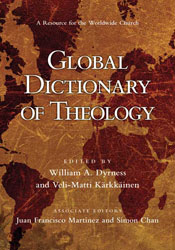 The emergent-friendly, Global Dictionary of Theology, makes a distinction between ‘Hopeful Universalism’ and ‘Convinced Universalism’:
The emergent-friendly, Global Dictionary of Theology, makes a distinction between ‘Hopeful Universalism’ and ‘Convinced Universalism’: Indeed, in the very preface of Love Wins, Bell contradicts Jesus’ teaching that few would actually be saved. Bell writes:
Indeed, in the very preface of Love Wins, Bell contradicts Jesus’ teaching that few would actually be saved. Bell writes: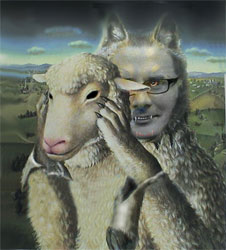 It is a sobering thought that Jesus went on to state in the verses immediately following His teaching on the narrow and broad roads, that false prophets would come in sheep’s clothing (Matthew 7:15-21). Such false prophets stand at the cross roads between the broad and narrow road, claiming to represent Christ, while pointing their followers toward the broad road that leads destruction, assuring them that it eventually leads to Heaven. Consider this for a minute. Isn’t this exactly what Rob Bell is doing?
It is a sobering thought that Jesus went on to state in the verses immediately following His teaching on the narrow and broad roads, that false prophets would come in sheep’s clothing (Matthew 7:15-21). Such false prophets stand at the cross roads between the broad and narrow road, claiming to represent Christ, while pointing their followers toward the broad road that leads destruction, assuring them that it eventually leads to Heaven. Consider this for a minute. Isn’t this exactly what Rob Bell is doing? Rob Bell not only redefines Hell by teaching that it will only be a temporary abode for those who want to leave later, but he redefines Hell by claiming that it is not so much about the after life, but it’s about what you make of the life here and now. In his book, Velvet Elvis, Bell had already stated this position:
Rob Bell not only redefines Hell by teaching that it will only be a temporary abode for those who want to leave later, but he redefines Hell by claiming that it is not so much about the after life, but it’s about what you make of the life here and now. In his book, Velvet Elvis, Bell had already stated this position: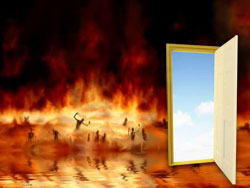 Rob Bell takes every possible liberty to deny reality and to either explain Hell away or get everyone into Heaven, regardless of his or her rejection of God and the Gospel. Bell not only empties Hell of God’s holy wrath, he creates an exit door from the inside out and claims that Hell is merely what we make it. He also claims that most of the imagery of future judgments in Hell were fulfilled on earth in AD 70 (p. 81).
Rob Bell takes every possible liberty to deny reality and to either explain Hell away or get everyone into Heaven, regardless of his or her rejection of God and the Gospel. Bell not only empties Hell of God’s holy wrath, he creates an exit door from the inside out and claims that Hell is merely what we make it. He also claims that most of the imagery of future judgments in Hell were fulfilled on earth in AD 70 (p. 81).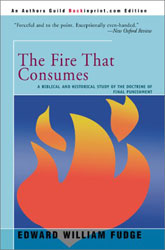 By claiming that the unrepentant wicked will have a chance to get to Heaven from Hell, Rob Bell has gone beyond that of Edward W. Fudge, who states in The Fire That Consumes,
By claiming that the unrepentant wicked will have a chance to get to Heaven from Hell, Rob Bell has gone beyond that of Edward W. Fudge, who states in The Fire That Consumes, 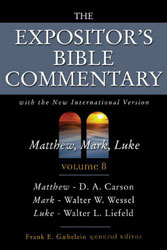 Biblical Scholar D.A. Carson, commenting on Matthew 25:46, says :
Biblical Scholar D.A. Carson, commenting on Matthew 25:46, says :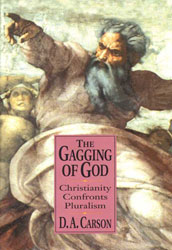 “What is hard to prove, but seems to me probable, is that one reason why the conscious punishment of hell is ongoing is because sin is ongoing.”
“What is hard to prove, but seems to me probable, is that one reason why the conscious punishment of hell is ongoing is because sin is ongoing.” There is hardly any wiggle room for a second chance in hell in these passages or anywhere in Scripture. Bell would have his readers believe of the book of Revelation that
There is hardly any wiggle room for a second chance in hell in these passages or anywhere in Scripture. Bell would have his readers believe of the book of Revelation that  May God give us the grace, in these times of apostasy, to hold fast to Jesus’ teachings and remain faithful to our loving and Holy Lord to the end. May God deliver His bride from the cotton candy Christianity that is endemic in Emergent Churches and among false prophets who lead the lost into believing they can put off repentance until after death.
May God give us the grace, in these times of apostasy, to hold fast to Jesus’ teachings and remain faithful to our loving and Holy Lord to the end. May God deliver His bride from the cotton candy Christianity that is endemic in Emergent Churches and among false prophets who lead the lost into believing they can put off repentance until after death.
Frederic E. Radler
AMEN! Thank-you for an understanding of the Nicolaitans, which OUR LORD (by their DEEDS and DOCTRINES) hate!!
Frederic E. Radler
Praise the Saviour and Lord of heaven and earth for his marvelous works. The FATHER and HIS SON are TRULY to be worshipped and honoured throughout eternity ‘wherein ONLY (added) dwells righteousness.’
Mauni
Truly amazing, the way you systematically explained it. Once saved is always saved. May I request your kind attention – could you please highlight (explain) Romans. 8 chapter. Yeah, sin, committing sin and leaving in sin.
Watchman Ministries
It pleases me that you have received a benefit from this study; all praise and glory to the Lord.
As to your question on the 8th of Romans, there is a study in the Signs of The Times by E.J. Waggoner which I believe you will find most fulfilling.
Please go to the following link and download the two PDF documents which you will find there.
https://www.dropbox.com/sh/78vej7wmsfuuddj/AAAgs3KjblrhiAoaHoP9KqLUa?dl=0
The study begins on page 87 of The Signs of the Times, Vol. 20 (1893, 1895) and you will find it continued on page 1 of the The Signs of the Times, Vol. 22 (1896).
I pray the spirit will guide you in your studies.
God Bless